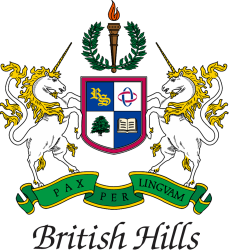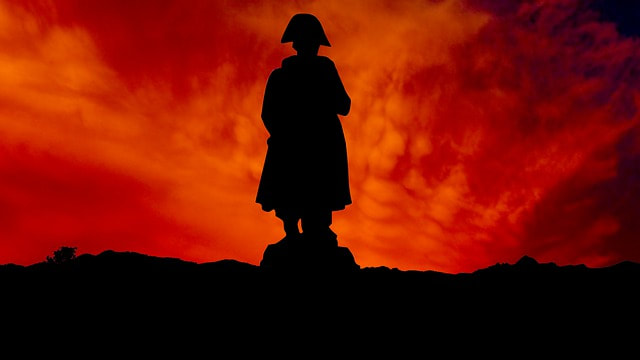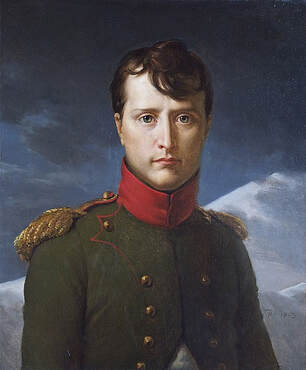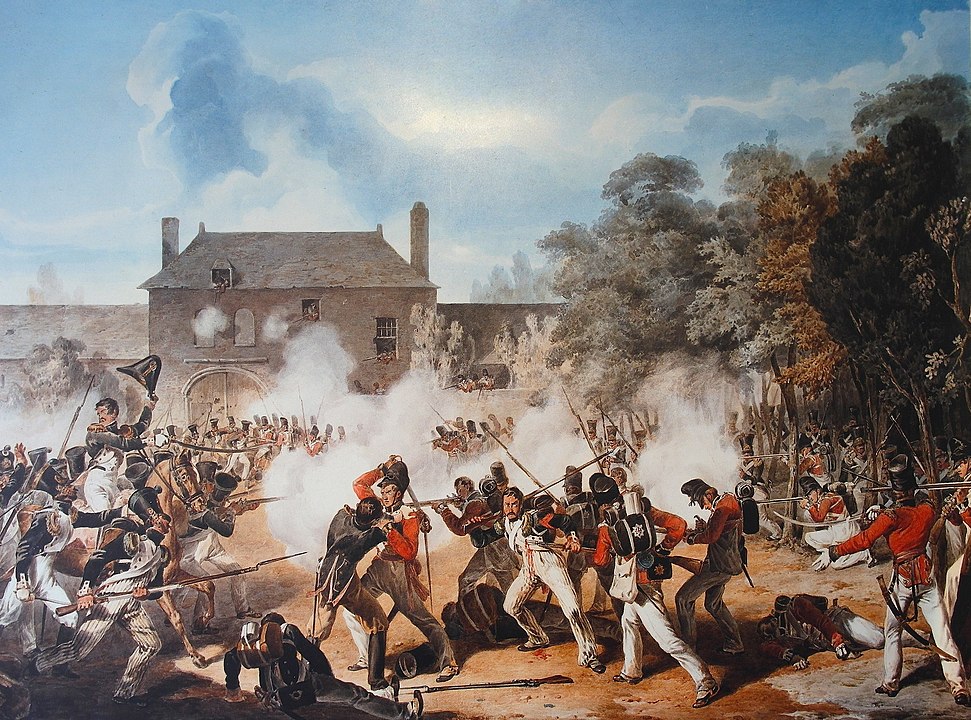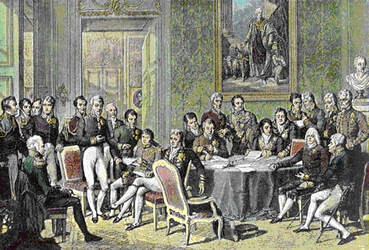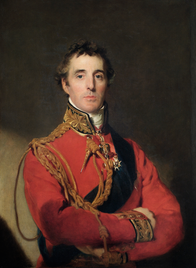Why is there a classroom at British Hills named Waterloo?
The Battle of Waterloo is one of the most well-known battles in British history. Find out more here!
The build up to Waterloo
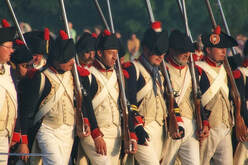
Not many days are as significant as 18th June 1815. On this day, history took a different course. The news that Napoleon had escaped prison in the island of Elba hit Europe like a bombshell. This was the day the Napoleonic era would end, with the battle of Waterloo: Napoleon, against the 7th coalition committed to preventing Napoleon's return to power.
Throughout the Napoleonic Wars, shifting alliances were pitted against France and its allies. This final coalition, the 7th, consisted of Britain, Austria, Spain, Russian, Prussia and numerous others. The quickly-formed alliance proclaimed that:
"Napoleon Bonaparte has placed himself without the pale of civil and social relations; and that, as an enemy and disturber of the tranquility of the world, he has rendered himself liable to public vengeance.”
The coalition declared they would:
“employ all their means, and unite all their efforts, so that the general peace, the object of the wishes of Europe and the constant purpose of their labours, may not again be troubled....".
During Napoleon's first time as Emperor and leader of France, many of these countries had endured territorial encroachments and suffered militarily. Moreover, the continental system imposed by Napoleon to counter the UK had contributed to economic hardships across Europe. When Napoleon was again declared Emperor, war seemed inevitable. Surrounded by hostile nations and a massive force, though, success for Napoleon was not. With an agreement that promised to support France or any other country which should be invaded by Napoleon and his supporters, all of Europe was effectively in league against one man.
Throughout the Napoleonic Wars, shifting alliances were pitted against France and its allies. This final coalition, the 7th, consisted of Britain, Austria, Spain, Russian, Prussia and numerous others. The quickly-formed alliance proclaimed that:
"Napoleon Bonaparte has placed himself without the pale of civil and social relations; and that, as an enemy and disturber of the tranquility of the world, he has rendered himself liable to public vengeance.”
The coalition declared they would:
“employ all their means, and unite all their efforts, so that the general peace, the object of the wishes of Europe and the constant purpose of their labours, may not again be troubled....".
During Napoleon's first time as Emperor and leader of France, many of these countries had endured territorial encroachments and suffered militarily. Moreover, the continental system imposed by Napoleon to counter the UK had contributed to economic hardships across Europe. When Napoleon was again declared Emperor, war seemed inevitable. Surrounded by hostile nations and a massive force, though, success for Napoleon was not. With an agreement that promised to support France or any other country which should be invaded by Napoleon and his supporters, all of Europe was effectively in league against one man.
The Battle of Waterloo
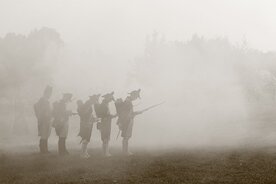
Returning to Paris from exile, Napoleon was able to raise an army of 100,000 men. Sending 30,000 of these men under General Grouchy to delay the Prussian army, Napoleon lead about 72,000 men against British-led forces at Waterloo in Belgium. Napoleon's army, full of veterans and well-trained, was however suffering from a brain drain at higher levels, with senior ranks given the lead of unfamiliar units.
On the other side, the Duke of Wellington would field a multi-national coalition of 68,000 men. Their allies, the Prussians, had another 48,000 men on their way to the battlefield. The numerical superiority of the allies did not bode well for Napoleon, whose decided his best hope was to ensure they did not link up - he would attempt to defeat the British before the Prussians arrived.
Wellington had fortified the small town of Waterloo, giving him a defensive advantage. Not only that, he had positioned most of his men behind a ridge, shielding them from the 250-gun artillery the French had. The day before the battle heavy rains fell, slowing the French preparations, forcing a delay and giving the Prussians more time to arrive. The French artillery, vital for French support, also become less accurate and more difficult to move due to the waterlogged grounds, negating the effectiveness of artillery bombardments.
On the other side, the Duke of Wellington would field a multi-national coalition of 68,000 men. Their allies, the Prussians, had another 48,000 men on their way to the battlefield. The numerical superiority of the allies did not bode well for Napoleon, whose decided his best hope was to ensure they did not link up - he would attempt to defeat the British before the Prussians arrived.
Wellington had fortified the small town of Waterloo, giving him a defensive advantage. Not only that, he had positioned most of his men behind a ridge, shielding them from the 250-gun artillery the French had. The day before the battle heavy rains fell, slowing the French preparations, forcing a delay and giving the Prussians more time to arrive. The French artillery, vital for French support, also become less accurate and more difficult to move due to the waterlogged grounds, negating the effectiveness of artillery bombardments.
|
Napoleon led with a diversionary attack on a small chateau called Hougoumont. The attack was meant to draw Wellington's force apart. When the British sent troops to support, Napoleon would then attack the main British force. This attack continued all day, but the French never did take the house, ultimately burning it down. Many historians believe that these attacks took vital resources away from the main French attack force.
Cavalry (horse-mounted soldiers) were also used heavily at Waterloo. Part of their effectiveness was the shock and fear they induced. Being charged at by mounted horses with men screaming “Vive l’empereur” would scare men and force mistakes. Late in the afternoon, French commander Michel Ney believed he spotted a weakness in the British lines. Hoping to take advantage of this, he ordered a cavalry charge to smash through the lines. However, along with the wet grounds slowing the horses, the British moved into anti-cavalry square formations with bayonets extended. This was highly effective, as horses could not engage and were vulnerable to gun fire behind the squares. |
Eventually, successful combined attacks from horses, artillery and infantry were able to disrupt the British lines. Cannon fire helped break the square formations, allowing horse attacks to decimate the British. The situation worsened for the British as the French were able to take the strategic position of Le Haye Sainte, a small farmhouse defended by a few hundred Germans. The French were close to breaking the coalition's centre line.
The battle suddenly changed, however, when in the distance the Prussian army began arriving in large numbers. Initially, the French believed the arriving army to be Grouchy's men, having stopped the Prussians. The arrival of the Prussians saw them and Wellington's men force the French to retreat. The Prussians chased them for miles, shooting them in large numbers, in cold blood.
Napoleon escaped to Paris, with his support among the people massively damaged. When the coalition allies arrived in Paris, the French government refused to defend him and he was arrested.
Surprisingly the final battle of the Napoleonic wars was a French victory, with Grouchy defeating the Prussian rear in the Battle of Wavre. By this time, however, Waterloo was lost and the war was over. The Prussians had successfully delayed the arrival of 30,000 French men which surely would have impacted the outcome.
The battle suddenly changed, however, when in the distance the Prussian army began arriving in large numbers. Initially, the French believed the arriving army to be Grouchy's men, having stopped the Prussians. The arrival of the Prussians saw them and Wellington's men force the French to retreat. The Prussians chased them for miles, shooting them in large numbers, in cold blood.
Napoleon escaped to Paris, with his support among the people massively damaged. When the coalition allies arrived in Paris, the French government refused to defend him and he was arrested.
Surprisingly the final battle of the Napoleonic wars was a French victory, with Grouchy defeating the Prussian rear in the Battle of Wavre. By this time, however, Waterloo was lost and the war was over. The Prussians had successfully delayed the arrival of 30,000 French men which surely would have impacted the outcome.
The Aftermath of Waterloo
Napoleon's final return to power and campaign, known as the Hundred Days, resulted in the defeat of Napoleon's "Grande armée" for the final time, his abdication, the end of the first French empire, the end of the Napoleonic wars (1803-1815) and the instatement of Louis XVIII as monarch.
Furthermore, the events of Waterloo ushered in a change to the European political order. No longer would France be at the centre of Europe. The continent's centre of gravity would shift northwards for the next century, an era of relative peace resulting from the “Pax Britannica.”
Furthermore, the events of Waterloo ushered in a change to the European political order. No longer would France be at the centre of Europe. The continent's centre of gravity would shift northwards for the next century, an era of relative peace resulting from the “Pax Britannica.”
|
The Congress of Vienna (a coalition of the great powers) would meet to confirm the new balance of power and prevent further war. The aim was that no one power should achieve hegemonic status - that no one nation could be powerful enough to threaten the peace. This congress was the first time representatives of states would gather at one time to decide the order of European politics. This "concert of Europe" would form the basic framework of European international politics until the advent of World War 1 a century later.
On a personal level, for a man who crowned himself Emperor in 1804 and had not long prior conquered a continent, Napoleon found himself exiled to St Helena, a remote island in the South Atlantic, a far cry from the palaces of Paris he once spent his time. He would die there, likely of stomach cancer, never seeing Europe or France again. |
|
Napoleon's legacy, however, remains to this day. The Napoleonic Code was the first modern formation of laws that were adopted across Europe, and laid the basis for many country's laws even today. Not until De Gaulle could France boast of a military leader and statesman of such consequence. Conversely, the man who lead the victorious army, the Duke of Wellington, would also cement his name as one of Britain’s great leaders and a national hero comparable to Nelson and Montgomery. The Battle of Waterloo and its aftermath signaled the end of French domination of Europe and a turning point in European history. No major European war would occur again until the Crimean War in 1853. |
Questions
Test yourself with the questions below:
1. How many coalitions were formed to defeat Napoleon?
2. Why was Napoleon so successful in his conquests?
3. Where was the prison in which Napoleon was being held before the battle?
4. Why was the coalition so surprised and worried by Napoleon’s escape?
5. Why did Napoleon send 30,000 men under Grouchy to attack the Prussians? Was this an effective strategy?
6. Despite the French having more artillery, why did this not prove so fateful to Wellington?
7. What happened which ultimately saved the British line and prevented Napoleon’s victory?
8. What was the final battle of the Napoleonic wars called?
9. Why was the campaign called the “100 days” campaign?
10. Why was peace maintained for so long after Waterloo?
11. What was the “Pax Britannica”?
